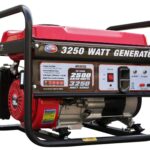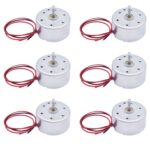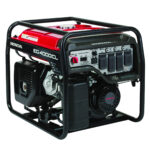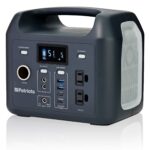Are you looking for an alternative to traditional generators to power your home? An alternative generator could be the answer to your energy needs. This type of generator offers a variety of benefits, including environmental friendliness, cost savings, and convenience. In this article, we’ll explore the advantages of an alternative generator and how it can help you power your home.
Definition of Generators

- A generator is an electrical device that converts mechanical energy into electrical energy.
- It works on the principle of Faraday’s law of electromagnetic induction, which states that a changing magnetic field produces an electric current.
- Generators are used in many applications, such as powering homes, businesses, and large industrial facilities.
- They can also be used to provide backup power in the event of an outage.
- Generators are available in a variety of sizes, from small portable units to large stationary models.
Types of Generators

Portable Generators: Portable generators are the most common type of generator. They are small, lightweight, and easy to transport, making them perfect for use in emergency situations or for camping trips. Portable generators are powered by gas, diesel, or propane, and can be used to power a variety of small appliances and electronic devices.
Standby Generators: Standby generators are permanently installed and usually powered by natural gas or propane. They are designed to kick in automatically when the power goes out and provide continuous power until it is restored. These types of generators are perfect for homes and businesses that need to remain operational during power outages.
Turbine Generators: Turbine generators are large, powerful generators that are used to generate electricity in industrial settings. They are powered by steam, gas, or water and are used to produce electricity for large-scale applications.
Wind Generators: Wind generators are becoming increasingly popular as an alternative energy source. They use wind turbines to generate electricity, which can be used to power homes and businesses.
Solar Generators: Solar generators are powered by the sun’s energy, and can be used to power small electronic devices or to provide back-up power to a home during a power outage.
Hydroelectric Generators: Hydroelectric generators are large, powerful generators that are used to generate electricity from the energy of moving water. These types of generators are often used in dams or other large-scale projects to generate electricity.
Uses of Generators

- Emergency backup power for homes and businesses.
- Backup power source for special events, such as festivals and concerts.
- Power for recreational activities, such as camping and boating.
- Powering medical equipment and other critical systems.
- Powering industrial and manufacturing processes.
- Powering computers, tablets, and other electronic devices.
- Powering mobile homes, trailers, and RVs.
- Powering tools and machinery.
- Powering construction sites and other temporary facilities.
- Powering farming operations, such as irrigation systems.
Advantages of Generators

- Generators are capable of providing power during outages and natural disasters.
- Generators are mobile, so they can be taken with you wherever you need power.
- Generators are powered by a variety of fuel sources, so they can be used in areas where electricity is not available.
- Generators are relatively inexpensive compared to other sources of power.
- Generators are relatively easy to maintain.
- Generators can be used to supplement existing power sources, or to provide backup power in case of an outage.
Disadvantages of Generators
| Advantages | Disadvantages |
|---|---|
| High power output | High operating costs |
| Portable & Versatile | Noisy & Polluting |
| Easy to use | Short life-span |
| Relatively low cost | Maintenance & Care required |
Generators are widely used for providing backup power and portable electricity. However, there are some significant drawbacks associated with their use. Generators require a large amount of fuel, making them expensive to operate. In addition, they are noisy and can produce a significant amount of pollution. Generators also have a relatively short life-span and require regular maintenance and care in order to keep them in good working order. Finally, while generators are generally a relatively inexpensive option, the cost of fuel and maintenance can add up over time, making them a less cost-effective choice in the long run.
Solar Power

Solar power is one of the most widely used forms of alternative energy. It is widely available and sustainable, and can be used to generate electricity, heat and light. Solar power systems use photovoltaics to convert sunlight into electricity, and are capable of providing a variety of energy needs, such as powering homes and businesses.
Advantages
Solar power has several advantages over other forms of energy. It is a renewable source of energy, meaning it is not limited and can be used indefinitely. It is also clean and does not produce any harmful emissions. Solar power is also cost-effective, as the initial installation cost is low and the electricity generated from solar power is free.
Disadvantages
One of the main drawbacks of solar power is that it is dependent on the weather, and can be unreliable in cloudy and rainy conditions. Solar power also requires a large amount of space for the installation of solar panels and the equipment needed to capture and store the energy. Additionally, solar power systems can be expensive to install and maintain.
Wind Power

Wind power is another form of alternative energy, which uses the wind to generate electricity. Wind turbines are placed on tall towers and use the kinetic energy of the wind to rotate the blades, which generate electricity. Wind power systems are relatively inexpensive to install and maintain, and can provide a reliable source of electricity.
Advantages
Wind power has several advantages over other forms of energy. It is clean and produces no emissions, and is a renewable source of energy. Wind power is also cost-effective, as the initial installation cost is low, and the electricity generated from wind power is free.
Disadvantages
Wind power is dependent on the weather, and can be unreliable in calm and windless conditions. Additionally, wind turbines can be noisy, and the installation of wind turbines can be controversial due to the visual impact they have on the landscape.
Hydro Power

Hydro power is a form of alternative energy which uses the power of flowing water to generate electricity. Hydro power systems use turbines to capture and convert the kinetic energy of the flowing water into electricity. Hydro power systems are capable of providing a reliable and cost-effective source of electricity.
Advantages
Hydro power has several advantages over other forms of energy. It is a renewable source of energy, meaning it is not limited and can be used indefinitely. It is also clean and does not produce any harmful emissions. Hydro power systems are relatively inexpensive to install and maintain, and can provide a reliable source of electricity.
Disadvantages
The main drawback of hydro power systems is that they require a large amount of space for the installation of turbines and the equipment needed to capture and store the energy. Additionally, hydro power systems can be disruptive to the natural environment, as they can interfere with fish migration and disturb the natural flow of rivers and streams.
4 Biomass

Biomass is a renewable source of energy that can be used to generate electricity. It is derived from organic substances like wood, animal waste, agricultural residues, and other materials. Biomass energy is considered clean energy since it does not produce harmful emissions like coal and oil-based energy sources.
| Type of Biomass | Application |
|---|---|
| Wood | Combustion, Gasification |
| Agricultural Residues | Direct Combustion, Anaerobic Digestion |
| Municipal Solid Waste | Gasification, Combustion, Pyrolysis |
| Energy Crops | Direct Combustion, Gasification, Pyrolysis |
Biomass energy can be used for electricity generation in various ways. It can be used for direct combustion, gasification, anaerobic digestion, pyrolysis and more. Combustion is the most common method for generating electricity from biomass, where the fuel is burned to generate heat. The heat is then used to turn a turbine, which generates electricity. Gasification is the process of converting biomass into a combustible gas, which can then be used to generate electricity. Pyrolysis is a process of heating biomass in the absence of oxygen to create a combustible gas, which can then be used to generate electricity.
Biomass energy is a promising alternative to traditional sources of energy generation, as it helps reduce greenhouse gas emissions and is renewable.
5 Geothermal
- Geothermal energy is the energy generated from the heat of the Earth’s core. It is a clean and renewable source of energy.
- Geothermal energy can be used to generate electricity through the use of geothermal power plants. These plants use the heat of the Earth to drive turbines, which generate electricity.
- Geothermal energy can also be used for direct heating. Hot water from geothermal sources can be used to heat buildings, greenhouses, and other structures.
- Geothermal energy is a reliable and efficient source of energy, with the potential to provide energy to remote and off-grid areas.
- Geothermal energy can be used in combination with other renewable energy sources, such as solar and wind, to provide a more reliable and consistent source of energy.
Advantages and Disadvantages of Alternative Generators
Advantages
- Alternative generators are more efficient than traditional generators, resulting in lower operating costs.
- Alternative generators are typically quieter than traditional generators, making them suitable for residential and commercial use.
- Alternative generators are typically more reliable, as they are designed with fewer moving parts and use fewer consumable parts.
- Alternative generators are typically more environmentally friendly than traditional generators, emitting fewer pollutants and requiring less maintenance.
- Alternative generators are often more compact than traditional generators, allowing them to be used in smaller spaces.
Disadvantages
- Alternative generators are typically more expensive than traditional generators, making them cost-prohibitive for some applications.
- Alternative generators typically require more maintenance than traditional generators, as they are designed with more complex components.
- Alternative generators are typically less powerful than traditional generators, making them unsuitable for some applications.
- Alternative generators typically require more time to start up than traditional generators, making them less suitable for emergency situations.
- Alternative generators often require specialized technicians for installation and maintenance, making them unsuitable for some applications.
Frequently Asked Questions
What is an Alternative Generator and How Does it Differ from a Regular Generator?
An alternative generator is an energy source that produces electricity without relying on traditional fuel sources like coal, natural gas, and oil. Unlike traditional generators, alternative generators use renewable energy sources, such as solar, wind, hydro, and geothermal power, to generate electricity. This makes them more efficient and environmentally friendly than regular generators. Alternative generators are also typically smaller and quieter, making them more suitable for residential use than traditional generators.
What are the benefits of using an alternative generator to power your home?
Alternative generators provide a number of advantages over traditional grid-based power sources. They are typically more reliable, can be cheaper to install and maintain, and offer greater control over energy usage. In addition, they can be used in remote locations, where grid-based power sources are not available. Alternative generators can also be used to supplement existing grid-based power sources, helping to reduce costs and improve energy efficiency. Furthermore, alternative energy sources can help reduce greenhouse gas emissions, as they do not burn fossil fuels.
What are some alternatives to using a generator to power your home?
Solar Power: Solar power is an increasingly popular alternative to traditional generators. Solar panels convert energy from the sun into electricity, which can then be used to power your home.
Wind Power: Wind turbines generate electricity by utilizing the power of the wind. Wind turbines can be set up to generate a steady stream of energy and can be used to power your home.
Hydroelectric Power: Hydroelectric power is generated by using the power of flowing water. This type of energy is generated by using dams, which allow the flow of water to turn a turbine and generate electricity.
Biomass: Biomass is a form of renewable energy that is generated by burning organic matter, such as wood or animal waste. This type of energy can be used to power your home.
Geothermal Power: Geothermal power is generated by using the heat from the Earth’s core to create electricity. This type of energy is created by drilling wells deep into the Earth to harness geothermal energy.
What are the advantages and disadvantages of using an alternative generator as opposed to a regular generator?
Advantages of alternative generators include cost savings, reduced noise levels, and lower emissions. Additionally, alternative generators are often smaller and lighter than regular generators, making them easier to transport and maintain. Disadvantages include the need for specialized parts and services, as well as reduced output when compared to regular generators. Additionally, alternative generators may not be able to handle the same power requirements as regular generators, meaning they may not be suitable for all applications.
What Types of Alternative Generators Are Available?
Alternative generators include solar, wind, geothermal, hydroelectric, and biomass. Solar panels are an increasingly popular option as they do not require fuel and are a renewable energy source. Wind turbines are also becoming popular, however their size and noise levels can be a disadvantage. Geothermal uses the earth’s natural heat to produce electricity, while hydroelectricity uses moving water to generate power. Biomass utilizes organic materials like wood, agricultural waste, and animal manure to generate power.
Conclusion
Alternative generators are a great way to power your home without relying solely on the traditional electricity grid. With a variety of benefits such as cost effectiveness, environmental friendliness, and convenience, alternative generators can help you save money and reduce your carbon footprint. Investing in an alternative generator is a great way to take control of your energy consumption and make a positive impact on the environment.







